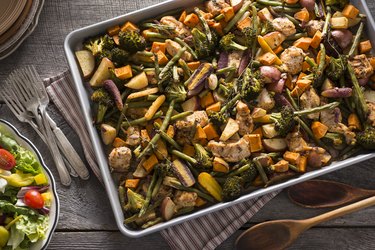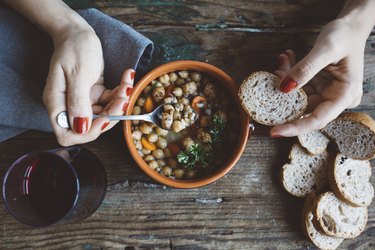
When you study nutrition, as a dietitian does, you learn about "slow carbs" and "fast carbs," which get their names from how quickly they release glucose, or sugar, into your bloodstream.
And while not all "fast carbs" are unhealthy (e.g. russet potatoes, pumpkin and pineapple), carbohydrates that break down more slowly generally come from healthy, high-fiber food sources like whole grains, legumes and most fruits.
Video of the Day
Video of the Day
So at first, the Slow-Carb Diet sounded like it had some promise. But alas, it appears the name of this weight-loss diet is misleading. Let's dig in and see what it's all about.
First Things First: What Is the Slow-Carb Diet?
The Slow-Carb Diet was created by Tim Ferriss, an OG biohacker. On his blog, there's a post dating back to 2007 titled "How to Lose 20 Pounds of Fat in 30 Days Without Exercise," which discusses the Slow-Carb Diet. But the diet was formally presented in his 2010 book The 4-Hour Body: An Uncommon Guide to Rapid Weight Loss, Incredible Sex, and Becoming Superhuman.
The diet has five "simple rules" and it's worth noting that there is a difference between simple and easy. A concept can be simple to understand, but that doesn't mean it's easy to follow or adhere to. One would argue this applies to the Slow-Carb Diet rules outlined below:
Rule #1: Avoid "white" starchy carbohydrates (or those that can be white). This means all bread, pasta, rice, potatoes and grains. The only time these foods are allowed, according to Ferriss, is within 1.5 hours of a resistance-training workout that lasted at least 20 minutes.
Rule #2: Eat the same few meals over and over again, especially for breakfast and lunch. Ferriss argues that we're "already doing this" i.e., eating very few foods, and that we just need to switch to eating a few of the "right" foods. In his view, eating a variety of foods, as recommended by most health experts, is not beneficial.
Rule #3: Don't drink calories. The Slow-Carb diet recommends that you eat your calories, not drink them. Exception: One to two glasses of dry red wine per night is allowed.
Rule #4: Don't eat fruit. The diet does not allow fruit because fruit includes a (natural) type of sugar called fructose, which Ferriss believes leads to "more body fat, more or less." Avocado and tomatoes are allowed.
Read more: Trying to Lose Weight? This is the One Food Group You Should Probably Cut (No, It's Not Carbs)
Rule #5: Take one day off per week and go nuts. One day a week you can eat anything and everything you want. No limitations.
What You Can and Can’t Eat
Here's a deeper dive into what you can and cannot eat on the Slow-Carb Diet when applying these five rules.
Fruit
- Allowed: Avocado and tomato
- Not allowed: All other fruit
Vegetables
- Allowed: All vegetables — broccoli, green beans, cauliflower, bell peppers, leafy greens, asparagus, radishes, etc.
Dairy
- Allowed: Cottage cheese
- Not allowed: All other dairy
Proteins
- Allowed: Beef, pork, chicken, fish, eggs
- Not allowed: Fried (breaded) proteins
Legumes
- Allowed: Lentils, beans, peas, soybeans
Grains
- None allowed
Fats
- Allowed: Olive oil, butter, ghee, nuts, creamer
Why You Might Want to Think Twice Before Trying the Slow-Carb Diet
There are a few red flags that give cause for concern when it comes to the Slow-Carb Diet. And really, these red flags should give you pause if you find any of these to be true for other diets.
- The creator of the diet is not a health professional. Ferriss is not a dietitian or a doctor, and he doesn't have a nutrition or medical background.
- If it sounds too good to be true, it is. The diet promises that you can lose "20 pounds in 30 days." Lofty claims like this are usually false or they require unhealthy and even dangerous methods.
- It's overly restrictive and cuts out entire foods groups like fruit. Eating the recommended daily servings of fruit per day, as outlined by the 2015-2020 Dietary Guidelines for Americans, will not make you fat. Plus, fruit and whole grains are important sources of nutrients.
- Cutting out major food groups, eating the same foods over and over and restricting then binging is not sustainable (or healthy) for most people. It's likely you'd resort to old ways of eating and gain back any weight you lost.
- The diet encourages supplements. Supplements should only be used to supplement your diet where you might be falling short on specific nutrients, not to speed up weight loss.
Read more: The Top 10 Worst Weight-Loss Diets of the Year

A Healthier Approach
When it comes to healthy eating, there is no one-size-fits-all approach. In general, a healthy diet is one that you can enjoy on a daily basis without feeling deprived or overly restricted.
A diet that focuses on fiber-rich fruits, vegetables and whole grains as well as lean proteins and limits added sugars and saturated fats will serve you well.
Research shows that simply placing an emphasis on eating whole foods over ultra-processed foods can help with weight loss. Researchers in a May 2019 study published in Cell Metabolism allowed subjects to eat as little or as much as they wanted of their respected diets — the ultra-processed group vs. unprocessed group. It turns out that although the diets were matched for calories, sugar, fat fiber and macronutrients, the ultra-processed group ate 500 extra calories per day on average and gained weight, while the unprocessed group actually lost weight.
Read more: How to Find the Best Weight-Loss Diet for You
- The Tim Ferriss Show: "How to Lose 20 lbs. of Fat in 30 Days… Without Doing Any Exercise"
- The 4-Hour Body: An Uncommon Guide to Rapid Weight Loss, Incredible Sex, and Becoming Superhuman
- 2015-2020 Dietary Guidelines for Americans: "A Closer Look Inside Healthy Eating Patterns"
- Cell Metabolism: "Ultra-Processed Diets Cause Excess Calorie Intake and Weight Gain: An Inpatient Randomized Controlled Trial of Ad Libitum Food Intake"